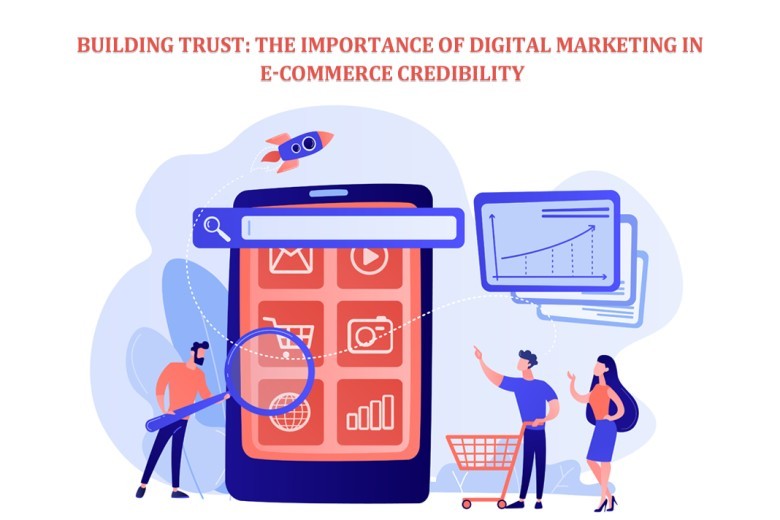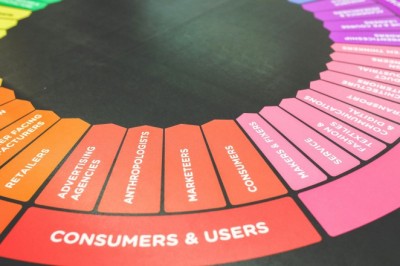views

Introduction
The e-commerce landscape has undergone a radical change. Gone are the days of dial-up internet and pixelated product images. Today, consumers enjoy a seamless online shopping experience, with a vast array of products just a click away. However, the very convenience of e-commerce presents a unique challenge: the lack of physical interaction with products and sellers. Unlike a traditional brick-and-mortar store, where you can hold a product, chat with a salesperson, and get a feel for the brand, online shopping relies on trust.
Building trust in the digital world is paramount for e-commerce success. Without it, customers hesitate to click “purchase,” conversion rates plummet, and customer loyalty becomes an elusive dream.
Fortunately, the rise of digital marketing provides a powerful arsenal of tools for building trust and establishing credibility in the online space. By leveraging content marketing, social media engagement, and strategic partnerships, e-commerce businesses can bridge the trust gap and cultivate a thriving customer base. This article will explore digital marketing strategies that can turn hesitant online shoppers into loyal brand advocates. Read on for more!
Understanding Trust in E-Commerce
In the realm of e-commerce, trust transcends a simple definition. It’s the bedrock upon which customer confidence and brand loyalty are built. Essentially, it’s the feeling a customer gets when they believe the online store will deliver a positive experience – from secure transactions to a quality product backed by excellent customer service.
Factors that Establish Trust
Several key factors contribute to establishing this trust:
● Security of transactions
● Data privacy
● Brand reputation
● Product quality and accurate descriptions
● Customer service experience
Psychological Factors that Influence Trust
Beyond these practical elements, psychological factors also influence trust online. Here are two key ones:
● Need for social proof
● Reduced risk perception
Next, let’s move into discussing digital marketing strategies for building trust.
Website Design and User Experience (UX)
In the competitive world of e-commerce, your website is your digital shopfront. A professional, secure, and user-friendly website fosters trust and encourages exploration. Here’s how website design and User Experience (UX) play a crucial role in building trust:
Professionalism
First impressions matter. A website with a clean, modern design, high-quality visuals, and clear branding establishes your brand as professional and legitimate. This professionalism translates to trust in your ability to deliver a quality product or service.
Clear Navigation and Intuitive Flow
Clear and intuitive navigation is essential for building trust. A well-structured sitemap, logical category breakdowns, and a user-friendly search bar are all crucial elements.
High-Quality Product Images and Descriptions
Without physical interaction, high-quality product images and detailed descriptions become the cornerstone of trust. Detailed, high-resolution images from multiple angles showcase the product accurately. Zoom functionality allows for closer inspection, building product quality confidence.
Complementing the visuals are comprehensive and accurate product descriptions. Highlight key features, benefits, specifications, and materials used. Addressing potential customer concerns proactively through the descriptions demonstrates transparency and builds trust.
Mobile Responsiveness
Today’s consumers are increasingly shopping on the go. A mobile-friendly website that adapts seamlessly to different screen sizes and devices demonstrates that you value your customers’ convenience and prioritize accessibility. This, in turn, fosters trust and encourages them to engage with your brand on their terms.
Content Marketing
Content marketing is a powerful tool for establishing your brand as an expert and building trust with potential customers. By consistently creating valuable and informative content, you position yourself as a trusted resource, not just a seller.
Here’s how content marketing fosters trust in e-commerce:
Establishing Expertise
Content marketing allows you to showcase your expertise in the products you sell. Informative blog posts, articles, and infographics that delve deeper into product features, benefits, and usage scenarios demonstrate your knowledge and understanding of the industry.
This educational approach positions you as a trusted advisor who can help potential customers make informed decisions. People are more likely to trust and buy from a brand they perceive as knowledgeable and reliable.
Additionally, consider incorporating interactive content formats like polls or quizzes, allowing customers to explore product features and suggest pricing preferences through WooCommerce Name Your Price functionality.
Transparency is Crucial
When creating content, you must avoid misleading information or overly promotional language. Focus on providing genuine value and addressing customer concerns honestly. Also, disclose sponsored content or affiliate links if applicable.
Social Proof and Customer Reviews
In the digital age, where online anonymity can breed suspicion, social proof has become a cornerstone of trust in e-commerce. Social proof refers to the psychological phenomenon where people are more likely to trust a product or service if others have already used and endorsed it. This is where customer reviews, testimonials, and user-generated content (UGC) come into play.
The Power of the “People Like Me” Factor
Customer reviews, testimonials, and UGC tap into the “people like me” factor. Seeing positive experiences from others with similar interests or demographics builds trust. It reduces the perceived risk of buying from an unfamiliar brand.
Strategies for Encouraging Genuine Reviews
● Make it easy to leave reviews
● Offer incentives
● Respond to all reviews
● Address negative reviews promptly and professionally
Embrace User-Generated Content
Don’t underestimate the power of UGC. Encourage customers to share photos and videos of themselves using your products on social media. Run contests or campaigns that leverage UGC. Showcasing real people using and enjoying your products adds authenticity and builds trust with potential customers.
Building Relationships and Community
The world of e-commerce can sometimes feel impersonal and transactional. Building relationships and fostering a sense of community goes beyond simply selling products – it’s about connecting with your customers on a deeper level.
The Power of Brand Personality
It’s the voice and essence of your brand – fun and quirky, professional and reliable, or environmentally conscious. Developing a brand personality allows you to connect with your target audience emotionally, fostering trust and loyalty.
Engaging on Social Media and Online Platforms
Social media platforms are powerful tools for engagement and community building. Respond to comments and messages promptly, participate in relevant conversations, and run interactive polls or contests. Showcase your brand personality through engaging content, like behind-the-scenes glimpses or product demonstrations.
Beyond Social Media: Exploring Online Communities
While social media is a crucial player, don’t limit yourself. Engage with relevant online communities (forums, discussion boards) where your target audience gathers. Offer valuable insights, answer questions authentically, and participate in discussions without being overly promotional. You organically build trust and brand loyalty by establishing yourself as a helpful presence.
Fostering a Community Around Your Brand
Building a community goes beyond simply interacting. Create a space where your customers can connect, share experiences, and feel part of something bigger. Host online events, encourage user-generated content challenges, or create loyalty programs that reward customer engagement.
Influencer Marketing
In the ever-evolving world of digital marketing, influencer marketing has emerged as a powerful tool for e-commerce businesses. By partnering with relevant and trusted influencers, you can leverage their established audience to build brand awareness and, more importantly, trust.
The Influencer Advantage
Influencers have cultivated communities of followers who trust their recommendations and opinions. When an influencer you trust promotes a product or service, it carries more weight than traditional advertising. This endorsement from a trusted source translates to increased trust in your brand for their audience.
Choosing the Right Partner
The key to success in influencer marketing lies in choosing the right partners. Here’s what to consider:
● Audience relevance
● Brand value alignment
● Authenticity and engagement
By carefully selecting influencers who resonate with your brand and target audience, you leverage their established trust to elevate your brand and build trust with potential customers.
Additional Strategies for Enhancing Credibility
A solid website design foundation, valuable content, and community engagement are crucial, but building trust requires a multi-pronged approach. Here are some additional strategies to further enhance your e-commerce credibility:
Security Seals and Trust Badges
In the online world, security seals and trust badges from reputable organizations act as visual cues that assure customers about secure transactions. Promising these badges on your website reassures customers that their financial information is protected and fosters trust in your commitment to secure transactions.
Clear Policies and Transparency
Uncertainty breeds distrust. Having clear and easily accessible policies on returns, refunds, shipping, and privacy demonstrates transparency and builds trust with potential customers.
Customer Service Accessibility
Excellent customer service is a cornerstone of trust in e-commerce. Customers must know they can easily reach out for help or address concerns. Providing multiple channels for customer service allows customers to choose their preferred method of communication, including:
● Phone support
● Email support
● Live chat
Conclusion
The digital landscape of e-commerce thrives on trust. Without physical interaction, building trust becomes the cornerstone of converting hesitant online shoppers into loyal brand advocates. Fortunately, a robust digital marketing strategy empowers you to bridge this gap and cultivate lasting customer relationships.
By implementing the strategies explored in this article – crafting a secure and user-friendly website to fostering a vibrant online community – you establish your brand as a trustworthy and reliable partner in the shopping journey. By consistently prioritizing customer satisfaction, transparency, and open communication, you’ll build a thriving e-commerce business that thrives in the competitive digital age.






















Comments
0 comment